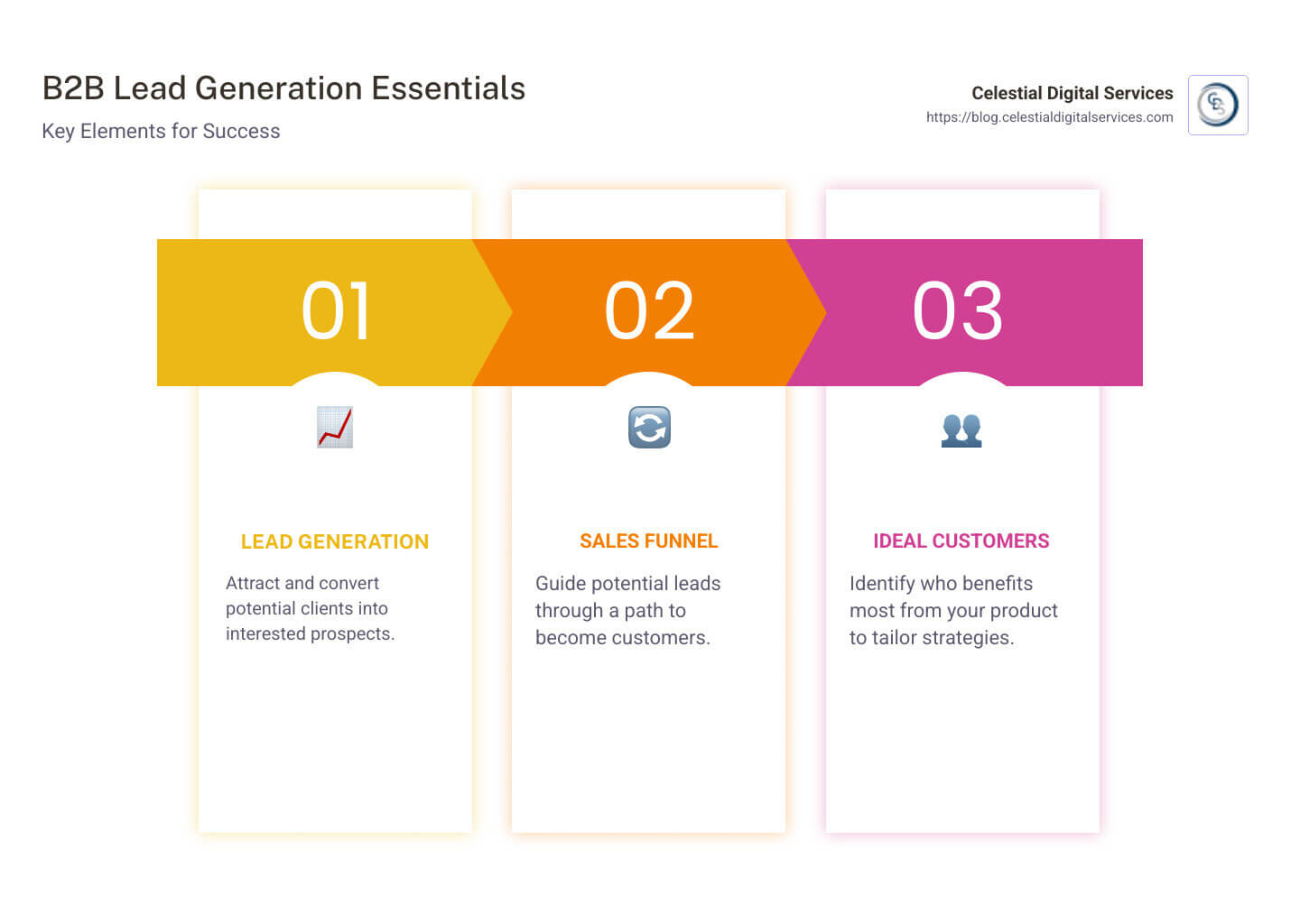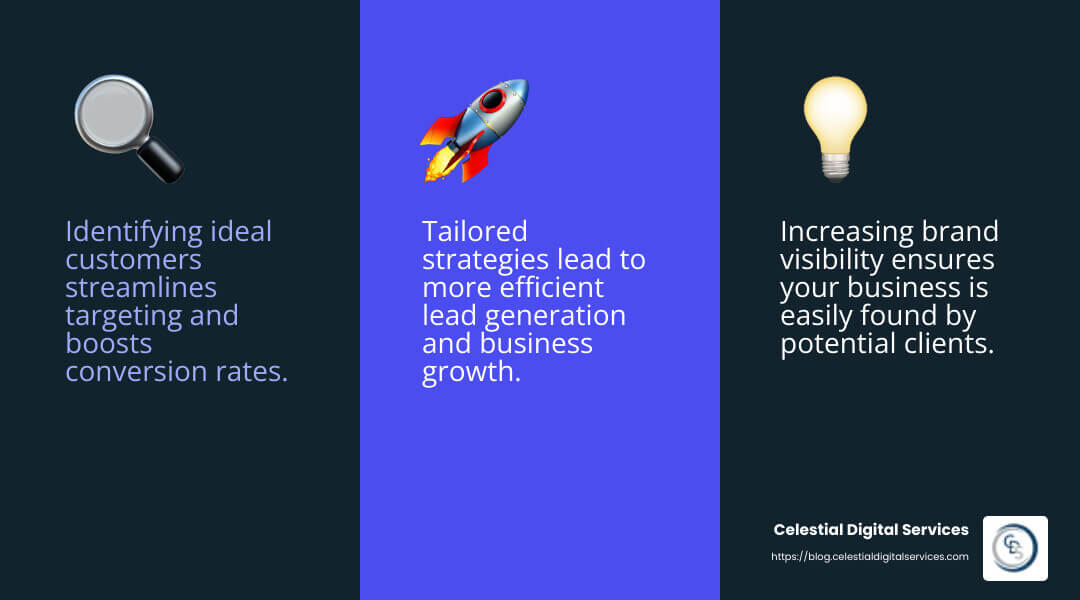Open uping the potential of a strong b2b lead generation strategy can be transformative for your business. If you’re seeking a quick understanding, here’s what you need to know:
- Lead Generation: This is the process of attracting potential clients and converting them into interested prospects.
- Sales Funnel: Visualize it as a path that guides potential leads toward becoming customers.
- Ideal Customers: Identifying who benefits most from your product helps tailor your strategy.
Getting these elements right can lead to more effective customer acquisition and drive significant business growth.
In the upcoming sections, you’ll find how to steer and master these concepts, setting your business on a path to success.

Leveraging over a decade of experience in digital marketing, I specialize in crafting successful b2b lead generation strategies. Throughout my career, I have consistently helped businesses improve their online presence and achieve their goals through innovative marketing techniques. Now, let’s dig deeper into understanding how these strategies can be effectively implemented to maximize your business potential.
Terms related to b2b lead generation strategy:
– b2b lead nurturing tactics
– digital marketing strategies to generate leads
– lead generation tactics
Understanding B2B Lead Generation Strategy
A B2B lead generation strategy is a structured approach to attracting and converting potential business clients into leads. Imagine it as a roadmap that guides your efforts to connect with other businesses that could benefit from your products or services.
Definition
At its core, B2B lead generation involves collecting information about potential clients—like their name, email, company, and job title. This information helps you target them with personalized sales pitches or ad campaigns. It’s distinct from B2C lead generation, which targets individual consumers.
Importance
A solid B2B lead generation strategy is the lifeline of your business. Without it, your sales pipeline dries up, and growth stalls. Lead generation is crucial because:
- Identifies Ideal Customers: Helps you pinpoint who your products or services best serve.
- Increases Brand Visibility: Positions your business where potential clients can find you.
- Improves Conversion Rates: Custom strategies mean higher chances of turning leads into paying customers.

Efficiency
Efficiency in B2B lead generation means doing more with less—less time, less effort, and less cost. Here’s how you can achieve it:
-
Inbound Marketing: Use content like blogs and social media to attract leads organically. Inbound leads often have shorter sales cycles and higher conversion rates.
-
Outbound Marketing: Reach out directly through cold calls or emails. This requires more nurturing but can effectively widen your reach.
-
Lead Qualification: Not all leads are created equal. Use lead scoring to prioritize those most likely to convert, ensuring your sales team focuses on high-potential prospects.
-
Technology Utilization: Employ tools like CRM systems to automate and streamline lead management. These tools can track interactions, score leads, and even predict sales outcomes.
By understanding and implementing these elements, you can create a B2B lead generation strategy that not only attracts but also efficiently converts leads into loyal clients. In the next section, we’ll explore the top strategies you can use to build a robust pipeline of B2B leads.
Top B2B Lead Generation Strategies
In B2B, generating leads isn’t just about casting a wide net—it’s about using the right tools and techniques to attract and convert the right prospects. Let’s explore some of the most effective B2B lead generation strategies.
Content Marketing
Content is king. But not just any content—valuable, relevant content that speaks directly to your audience’s needs.
-
Blogs: Write educational posts that solve problems or answer questions your target audience has. This positions you as an industry expert and builds trust.
-
Case Studies: Showcase real-life examples of how your product or service has helped other businesses. This acts as social proof and can be a powerful motivator for potential clients.
-
Long-Form Content: Long-form articles (1,900-2,000 words) perform exceptionally well on platforms like LinkedIn, providing in-depth insights that engage readers.

Social Selling
Social media isn’t just for B2C. Platforms like LinkedIn are goldmines for B2B connections.
-
LinkedIn: With 55% of decision-makers using LinkedIn to vet companies, it’s crucial to maintain a strong presence. Share insightful content and engage in meaningful discussions.
-
Other Platforms: Don’t ignore Facebook, Twitter, and Instagram. They offer unique opportunities to connect with businesses in a more casual setting.
Webinars
Webinars are an excellent way to demonstrate your expertise and engage with potential leads in real time.
-
Showcase Your Product: Use webinars to highlight the benefits and applications of your product. They’re more interactive than demos and often have higher conversion rates.
-
Gather Leads: The registration process for webinars naturally collects lead information, which you can use for follow-up campaigns.
SEO (Search Engine Optimization)
SEO is about making sure your content is found by the right people at the right time.
-
Keyword Optimization: Use relevant keywords to improve your search engine ranking. This helps potential leads find your content more easily.
-
Competitor Analysis: Look at what keywords your competitors are using and find opportunities to differentiate your content.
Email Campaigns
Email remains a powerful tool for nurturing leads through the sales funnel.
-
Personalization: Tailor your messages to address the specific needs and interests of your leads. This increases engagement and conversion rates.
-
Automation: Use CRM systems to automate email sequences, ensuring timely and relevant communication with your leads.
By leveraging these B2B lead generation strategies, you can build a robust pipeline that not only attracts but also nurtures and converts leads into loyal clients. Up next, we’ll explore how technology can further improve your lead generation efforts.
Effective Use of Technology in B2B Lead Generation
Technology is a game changer in B2B lead generation strategy. With the right tools, you can automate processes, manage relationships, and prioritize leads more effectively. Let’s explore how automation, CRM systems, and lead scoring can improve your strategy.
Automation
Automation is like having an extra pair of hands. It allows you to streamline repetitive tasks, freeing up time for more strategic activities. More than 30% of sales tasks can be automated, from lead management to follow-ups. This not only boosts efficiency but also improves customer satisfaction by ensuring timely interactions.
-
Email Sequences: Use automated email campaigns to nurture leads. Set up sequences that send personalized messages based on a lead’s behavior or stage in the sales funnel.
-
Chatbots: Implement AI-powered chatbots to engage with website visitors in real time. They can answer common queries and even schedule follow-up calls.

CRM Systems
Customer Relationship Management (CRM) systems are the backbone of effective lead management. They help you track interactions, manage data, and keep communication organized.
-
Centralized Data: Store all lead information in one place. This makes it easy to access and update records, ensuring everyone on your team is on the same page.
-
Integration: Many CRM systems integrate with other tools, such as email marketing platforms and social media, allowing for seamless data flow and more comprehensive insights.
Lead Scoring
Lead scoring is like grading your leads, helping you focus on those most likely to convert. By assigning scores based on engagement and fit, you can prioritize your efforts where they matter most.
-
Behavior Tracking: Monitor how leads interact with your content and website. High engagement indicates a higher likelihood of conversion.
-
Demographic Fit: Consider factors like company size, industry, and job title to determine how well a lead matches your ideal customer profile.

Incorporating these technologies into your B2B lead generation strategy not only improves efficiency but also ensures a more personalized and effective approach to nurturing leads. Up next, we’ll dive into best practices that can further refine your strategy.
5 Best Practices for B2B Lead Generation
Creating a successful B2B lead generation strategy isn’t just about using the right tools—it’s about how you use them. Here are five best practices to ensure your strategy is both effective and efficient.
1. Personalization
Personalization is key to making your prospects feel valued. Over 70% of B2B marketers are personalizing their efforts, and for a good reason. Personalized content can significantly improve engagement and conversion rates.
-
Custom Messaging: Customize your communication based on the prospect’s industry, company size, and specific needs. This shows that you understand their challenges and can offer relevant solutions.
-
Dynamic Content: Use dynamic content on your website and emails to display information that resonates with individual visitors.
2. Data-Driven Decisions
Making decisions based on data rather than gut feelings can drastically improve your results. Data-driven strategies are about using insights to guide your actions.
-
Analytics: Use analytics tools to track the performance of your campaigns. This will help you understand what’s working and what needs adjustment.
-
A/B Testing: Regularly test different versions of your content and strategies to see which performs better. This helps refine your approach over time.
3. Multi-Channel Approach
Don’t put all your eggs in one basket. A multi-channel approach ensures you reach your audience wherever they are.
-
Social Media: Engage with prospects on platforms like LinkedIn, Twitter, and Facebook. This not only builds brand awareness but also opens new avenues for lead generation.
-
Email Campaigns: Use email marketing to nurture leads. Segment your audience to send targeted messages that address their specific needs.
4. Relationship Building
Building strong relationships with your prospects is crucial for long-term success. It’s not just about closing a sale—it’s about creating lasting partnerships.
-
Regular Engagement: Stay in touch with leads through newsletters, updates, and personalized messages. This keeps your brand top-of-mind.
-
Customer Feedback: Encourage feedback and use it to improve your offerings. This not only improves customer satisfaction but also strengthens your relationship with them.
5. Continuous Optimization
The digital landscape is always changing, and so should your strategies. Continuous optimization ensures your B2B lead generation strategy stays effective.
-
Review and Adjust: Regularly review your strategies and make necessary adjustments. This keeps your approach fresh and aligned with current trends and technologies.
-
Stay Informed: Keep up-to-date with industry news and trends. This knowledge can help you anticipate changes and adapt your strategy accordingly.
By implementing these best practices, you can create a robust and adaptable strategy that not only generates leads but also converts them into loyal customers. Next, we’ll tackle some frequently asked questions to clear up any uncertainties you may have about B2B lead generation.
Frequently Asked Questions about B2B Lead Generation Strategy
What is a B2B lead generation strategy?
A B2B lead generation strategy is a plan designed to attract and convert businesses into potential customers. Unlike B2C, where businesses sell directly to consumers, B2B focuses on selling products or services to other businesses. This strategy involves collecting information like names, emails, and company details to target potential clients with personalized sales pitches and marketing campaigns.
Examples of B2B lead generation tactics include content marketing, using platforms like LinkedIn for networking, and offering valuable resources like whitepapers in exchange for contact information. These methods help build a pipeline of qualified leads, which are crucial for driving sales and business growth.
How do I generate leads for my B2B business?
Generating leads for a B2B business requires a deep understanding of your target audience. Start by identifying the businesses that would benefit most from your products or services. Analyze their demographics, industry, and pain points to tailor your approach.
Content creation is a powerful tool in lead generation. Develop informative and engaging content that addresses your audience’s needs. This can include blog posts, videos, and webinars. According to research, 93% of B2B buying processes begin with an online search, making content marketing central to your strategy.
Another effective method is using Account-Based Marketing (ABM). ABM focuses on creating personalized campaigns for specific accounts, allowing you to engage with high-value prospects more effectively. Partnerships can also be valuable, as they provide access to new networks and potential leads.
What are the most efficient lead generation strategies for B2B marketers?
Efficiency in lead generation often comes down to using the right strategies and tools. Here are some of the most effective methods:
-
Account-Based Marketing (ABM): This strategy involves tailoring your marketing efforts to specific high-value accounts. By focusing on the needs and challenges of these accounts, you can create more targeted and impactful campaigns.
-
Content Marketing: As mentioned earlier, content is king. High-quality, informative content can position your business as a thought leader and attract potential leads. Use SEO techniques to ensure your content reaches the right audience.
-
Partnerships: Collaborating with other businesses can open doors to new markets and audiences. Partnerships can be mutually beneficial, providing exposure and credibility to both parties.
By integrating these strategies, B2B marketers can generate high-quality leads more efficiently and effectively.
Conclusion
In today’s digital world, businesses need a reliable partner to steer the complexities of online marketing. That’s where Celestial Digital Services comes in. Our mission is to empower small enterprises and startups with innovative digital solutions that drive growth and success.
We understand that the backbone of any thriving business is an effective B2B lead generation strategy. At Celestial Digital Services, we specialize in crafting strategies that not only attract potential clients but also convert them into loyal customers. Our expertise in SEO, social media marketing, and lead generation ensures that your business stands out in a crowded marketplace.
Our approach is simple yet powerful. We focus on understanding your unique business needs and tailoring our solutions to meet them. Whether it’s developing a mobile app, optimizing your website, or leveraging AI-based tools, we provide the support you need to improve your online presence.
One of the ways we empower businesses is by simplifying digital marketing for those who may not be technically inclined. We believe that every business, regardless of size, deserves the chance to thrive online. By offering user-friendly solutions and expert guidance, we make digital marketing accessible to all.
To learn more about how we can help your business succeed with a winning lead generation strategy, visit our lead generation service page.
Together, let’s open up the potential of your business and pave the way for a successful future in the digital landscape.



